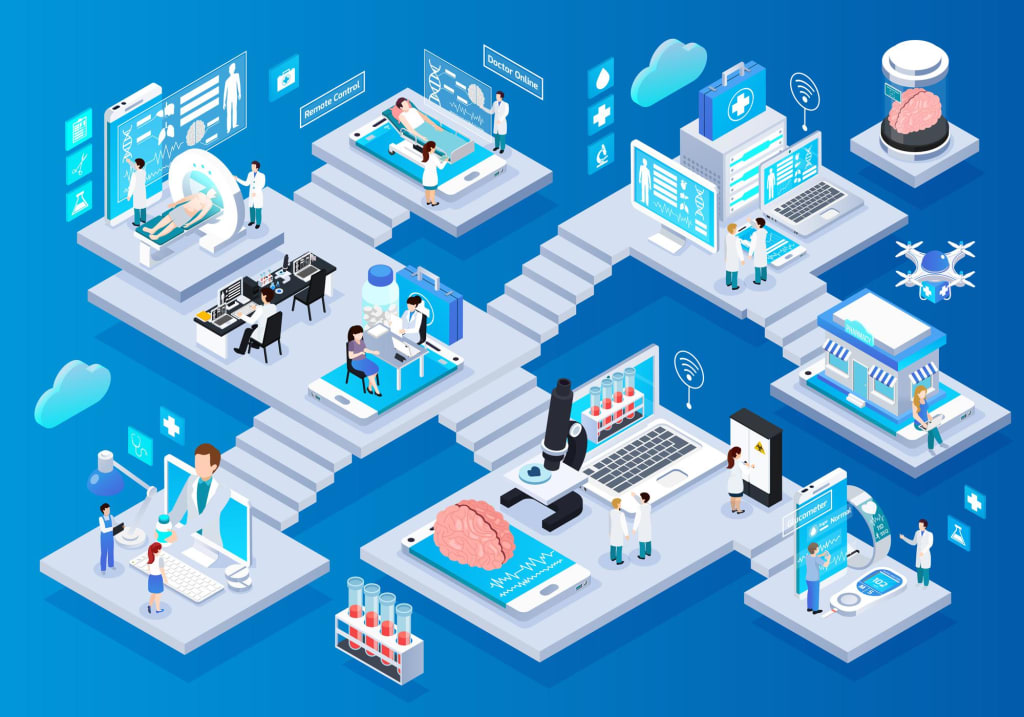
Introduction
In recent years, healthcare apps have emerged as a transformative force in the healthcare industry. These applications have not only changed the way patients manage their health but have also revolutionized the healthcare ecosystem as a whole. As we look ahead, the future of healthcare apps promises even more groundbreaking innovations. In this article, we will explore the emerging trends and innovations that are shaping the future of healthcare apps.
Telehealth and Remote Monitoring
Telehealth has seen explosive growth, accelerated by the COVID-19 pandemic. Healthcare apps have played a pivotal role in facilitating remote consultations, enabling patients to connect with healthcare providers from the comfort of their homes. This trend is likely to continue as patients and providers alike recognize the convenience and accessibility of telehealth services
Furthermore, remote monitoring is becoming increasingly sophisticated. Wearable devices and sensors can continuously track vital signs, medication adherence, and other health metrics. Healthcare apps are integrating these data sources to provide real-time insights to both patients and healthcare professionals, allowing for more proactive and personalized care.
AI-Powered Healthcare Apps
Artificial Intelligence (AI) is poised to transform healthcare apps in numerous ways. Machine learning algorithms can analyze vast amounts of medical data, assisting with diagnosis, treatment recommendations, and predictive analytics. AI-driven chatbots and virtual assistants are also becoming more sophisticated, offering patients 24/7 support and information.
Additionally, AI is enhancing the accuracy and efficiency of image recognition and interpretation, making radiology and pathology diagnoses more reliable. The ability to detect diseases like cancer at an earlier stage through AI-driven apps can significantly improve patient outcomes.
Personalized Medicine
Personalized medicine is an evolving field that tailors treatments and interventions to an individual's unique genetic makeup, lifestyle, and health history. Healthcare apps are at the forefront of this revolution. They can collect and analyze a patient's data to provide personalized health recommendations, including medication dosage, dietary plans, and exercise regimens.
Genomic data integration is also becoming more prevalent. Patients can now upload their genetic profiles to healthcare apps, allowing for even more precise treatment plans and preventive measures based on genetic predispositions.
Blockchain for Health Records
Privacy and data security are paramount in healthcare. Blockchain technology is being leveraged to ensure the integrity and security of electronic health records (EHRs). Healthcare apps are adopting blockchain to provide patients with full control over their health data. Patients can grant or revoke access to their records, ensuring that sensitive information remains private and secure.
Moreover, blockchain can facilitate interoperability between different healthcare systems and providers, ensuring seamless data sharing while maintaining data integrity.
Mental Health and Wellness Apps
The importance of mental health has gained widespread recognition, and healthcare apps are responding to this need. Mental health and wellness apps offer tools for meditation, stress management, cognitive-behavioral therapy, and mood tracking. These apps are helping individuals manage their mental health proactively and access support when needed.
In the future, we can expect the integration of AI and wearables to provide more accurate and timely insights into mental health, potentially detecting conditions like depression and anxiety before they become severe.
Conclusion
The future of healthcare apps is incredibly promising, with innovations spanning telehealth, AI-driven solutions, personalized medicine, blockchain security, and mental health support. These trends are not only enhancing patient experiences but also revolutionizing the way healthcare is delivered and managed. As technology continues to advance, healthcare apps, supported by dedicated healthcare application development services, will play an increasingly central role in promoting wellness, preventing diseases, and providing efficient and accessible healthcare for all. These services will be instrumental in bringing these innovations to life, ensuring that healthcare apps continue to evolve and meet the ever-changing needs of patients and healthcare professionals alike.





Comments
There are no comments for this story
Be the first to respond and start the conversation.